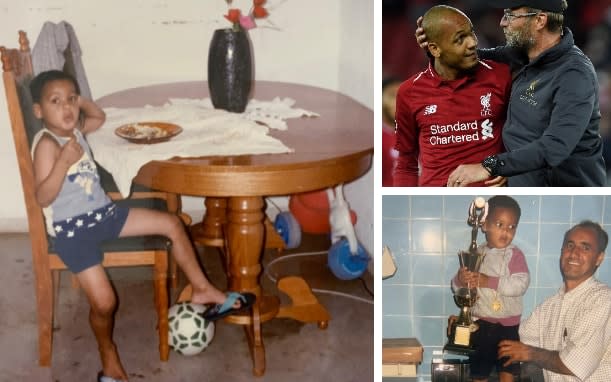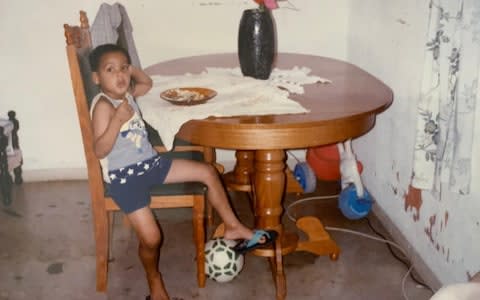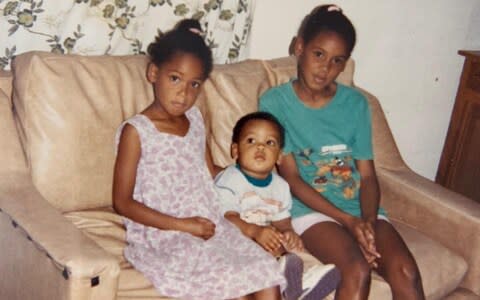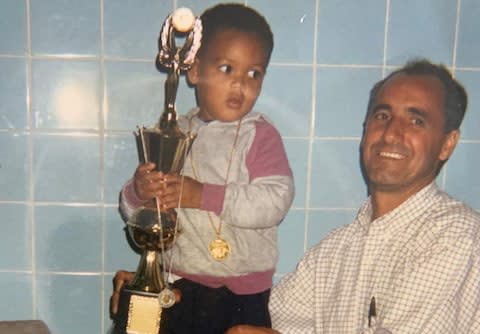The making of Fabinho: how counting birds, Jose Mourinho's hotel visit and Jurgen Klopp's videos turned him into a superstar

For a player of such relentless drive, energy and focus, Fabinho was a surprisingly ditzy teenager. Sometimes, this was a source of humour - as in the story Elio Sizenando, his old coach at Paulinia FC in Brazil, tells of him habitually spending the first 10 minutes of matches counting birds perched around the stadium rather than focusing on the job in hand.
Occasionally, however, the consequences were rather more serious. On one trip to training at Paulinia with his close friend Lucas Alba and another young player, their car was stopped at a police checkpoint - not an unusual occurrence in itself, but one that still merited a swift response, given the reputation of the Brazilian authorities.
“Me and my friend got out of the car and we were already being frisked, but Fabinho just stayed inside on the back seat, not realising what was happening," recalls Alba. “When he finally came out, he scared the police stiff because they hadn’t noticed that there was another person with us. That was Fabinho back in the day - a totally absent-minded boy. Fortunately, nothing happened to us so we can still laugh about this story, but it shows how distracted he was."
Fabinho, now 26, has come a long way since then, in all senses. The naive youth who grew up in Campinas, 60 miles from Sao Paulo City, as the youngest of three children - and who once mortified his pastor father, Joao Roberto, and mother Rosangela, a cleaner, by climbing into the pulpit of their local church to mess around with the microphone - is now one of the central cogs in possibly the world's finest club team at Liverpool.
His tireless performances had already long since won over the Kop - indeed, in the 31 Premier League matches he has started, Liverpool have yet to lose - but it was his spectacular long-range goal in the crushing victory over title rivals Manchester City a fortnight ago made the world sit up and take notice.
Despite all this, those closest to Fabinho insist he has hardly changed. He remains very close to his family, and especially his two sisters Ana Paula and Juliana, and the friends with whom he grew up.
Alba is probably the best of them, their bond forged from days spent on the same futsal team in Campinas, and on long bus rides into training at Paulinia.

"They were our best days growing up," Alba says. "There was a lot of banter between all the boys and 'Manga' [Mango] is still his nickname because of the shape of his head. Although Fabinho is a reserved person, he is also quite clever and funny - he used to plan pranks that others could then make happen.”
Not that Fabinho always appeared destined for stardom. Although he was a regular starter as a full-back in most of his youth teams, that issue of poor concentration held him back.
“We could see that he was smart, but his lack of concentration was so big," Sizenando recalls. "He would make mistakes, and get lost defending. It was all related to this concentration level that was very low because he was slow to mature.”
So bad was the issue that Sizenando even gave one of his assistants the specific task of yelling at Fabinho from kick-off in order to spark him into life. The tactic was extreme, but it worked.
“One of his main merits”, Sizenando continues, “is that he always listened to what all the coaches told him. I must admit that I nagged him a lot, but I did that because I saw he had potential and that he had to overcome his introvert personality to deliver what he could. He used to listen, ask questions and put everything in practice. Perhaps I was one of the first managers to truly believe his talent.”


Monaco's Leonardo Jardim is the coach commonly credited with switching Fabinho from his preferred position of right-back to holding midfielder, but in fact he first played in that position in Paulinia's under-17 side under Sizenando, after a growth spurt convinced the coach that he could cope with the role's physical demands. “He played as a central midfielder, but also as a centre-back and attacking midfielder - wherever you put him he will do well," Sizenando says.
When Fabinho had his major breakthrough in the group stage of the 2011 Copa Sao Paulo, Brazil’s most distinguished under-20 tournament, he was already being followed closely by scouts sent by Lucio Araujo, the brother of former Barcelona midfielder Deco and who now works with the super-agent Jorge Mendes.
Araujo duly snapped him up, and from there his progress was rapid. He quickly joined Fluminense's academy, won a call-up to the Brazil under-20 squad and then - aged 18, and finding senior opportunities limited - moved to Portuguese club Rio Ave, then managed by Nuno Espirito Santo, now head coach at Wolves.
It was one month later that Fabinho's life took its most surprising turn yet. “I was in Portugal with him”, Araujo recalls, “and Jorge Mendes called me. He said: ‘Fabinho is going to Real Madrid Castilla [the club's reserve team].' Mourinho wanted Fabinho to be the replacement of Daniel Carvajal who was being sold to Bayer Leverkusen."

Even Fabinho did not believe the interest was genuine - he was convinced his agent was joking, even as the pair made the five-hour car journey to Madrid. “He only believed he was joining Real when Mourinho knocked his hotel room door next morning,” Araujo says, with a laugh.
Senior opportunities remained elusive at the Bernabeu but the platform offered in Spain ultimately accelerated Fabinho to the top tier of European football. He joined Monaco in 2013, initially on loan and then permanently two years later, and was one of the pillars of the team that reached the Champions League semi-finals in 2016-17.
It was here that his conversion to midfield became permanent, even if the player himself was reluctant: he even asked Araujo if he could have a clause written into his Monaco contract stating that right-back was his mandatory position.
Fabinho enjoyed his five seasons in France, but when Liverpool expressed an interest in signing him in 2018, he had no hesitation in answering the call. “Paris Saint-Germain, Manchester United, Manchester City and Juventus also talked to his agent, but it was Liverpool that made all the effort to sign him,” says Ricardo Assis, Fabinho’s brother-in-law, who lived with him in Monaco for three years. “Klopp showed him videos of the team, explained why he wanted to sign him but he also made it clear that it wouldn’t be straightforward for him to be a regular starter from the beginning. Fabinho left the meeting determined to join Liverpool”.
A £43 million move to Anfield was followed by a vital role in the Champions League-winning campaign, and prompting many to conclude that the void left by Steven Gerrard has finally been filled. Now, Liverpool are understood to be keen to extend Fabinho's contract.
Fabinho's return trips home are inevitably more infrequent now, but his old friends and mentors still look on with a sense of pride in how that distracted kid from Campinas has turned himself into one of the world's most coveted talents - even if his old coach, Sizenando, still sees room for improvement.
"There is something that he still can do more: attacking," he says, sternly. "He is very good at shooting, and we could see that against City."
Even Sizenando, however, can allow his craggy facade to crack a touch. "But it is beautiful to watch him doing all this at such a high level.”

